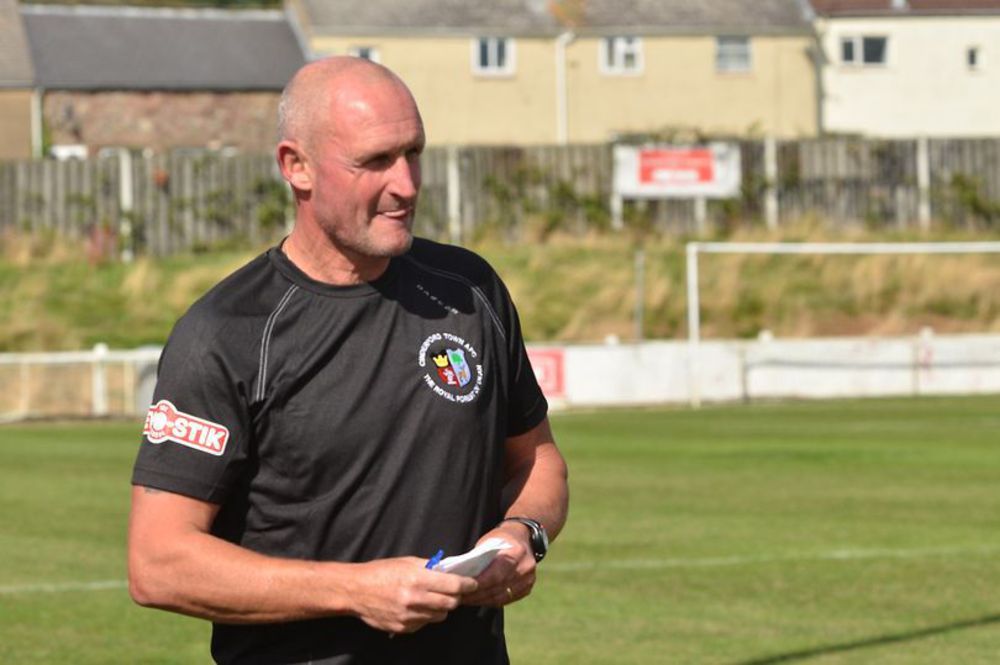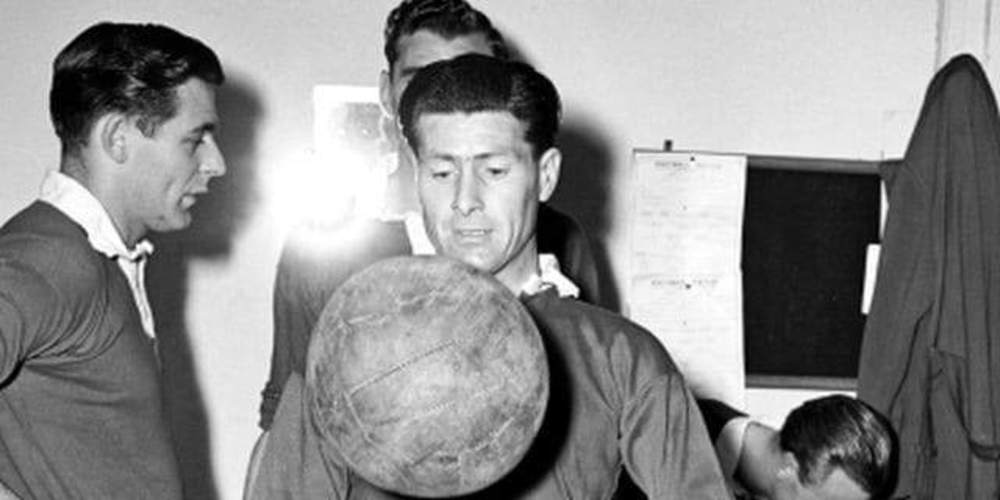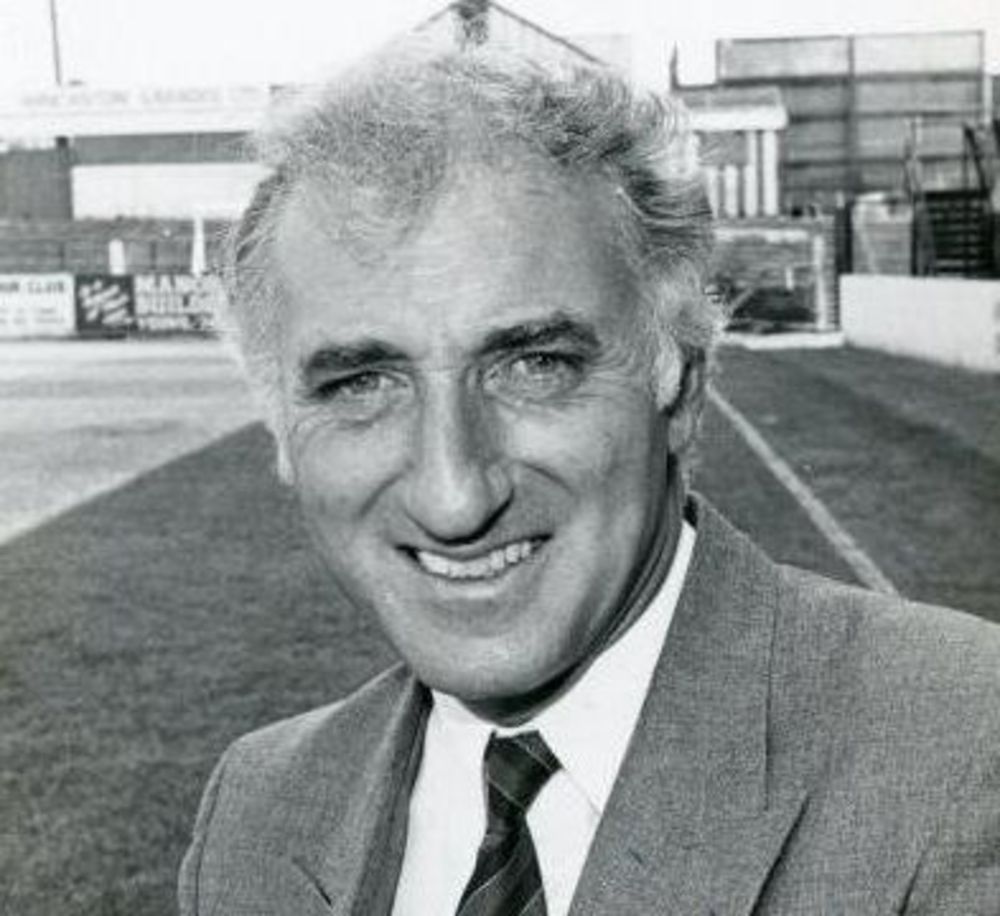Chris Burns

Chris Burns (Photo: Gloucestershire Echo)
Chris Burns started his career with Cheltenham Town before joining Portsmouth in 1990.
After helping Pompey to the 1992 FA Cup semi-finals, Burns went on to have spells at Swansea City, Bournemouth and Northampton Town before spending two spells at Gloucester City where he made over 300 appearances spanning nearly eight years.
Burns became a real fan favourite at Gloucester, both for what he achieved on the pitch but also for what he did for the club in his time as player-manager.
He led a largely home-grown side to promotion in 2003/04, but it was the side of 2002/03 that turned heads, as Burns assembled a side that reached the FA Trophy quarter-finals after defeating Woking and Southport along the way.
As a player, Burns was part of the Gloucester side led by Leroy Rosenior that were so close to promotion in the 1997 season, also reaching the FA Trophy semi-finals of the same year.
He was a fierce competitor and very strong in the tackle, producing his best performances for the Tigers from midfield but also being comfortable playing at the back.
As a manager though, Burns guided the club through some unbelievably tough times, overcoming a lot of off-field issues to assemble one of the most talented City sides for many years.
He went on to manager Cinderford Town, Bishops Cleeve and Brockworth Albion and was appointed as manager of Hellenic League Division One West club Stonehouse Town in the summer of 2020.
Ken Jones
Started his managerial career with Shifnal Town, who he led to the West Midlands (Regional) League Division One in 1978/79, followed by the WMR Premier Division title twice in 1980/81 and again in 81/82.
He also led them to the Welsh Intermediate Cup Final, losing to Cardiff College at Knighton Town FC.
He moved to Bridgnorth Town the following season and guided them to the Midland Combination title in 1982/83 which earned promotion to the Southern League Midland Division.
Jones, who also coached in the United States during the close seasons, spent five seasons in charge at Bridgnorth in the Southern League.
Doug Millward
Sheffield-born, Doug Millward was a forward who had unsuccessful spells with Doncaster Rovers and Southampton.
It wasn`t until being signed by Alf Ramsey for Ipswich Town, at the age of 24, that his career really took off.
He holds the distinction of scoring Ipswich`s fastest ever goal when he hit the back of the net after just 10 seconds against Newport County at Portman Road in February 1957 - before any of the visiting players had touched the ball!
Although not an absolute regular starter for the Tractor Boys, he was, nevertheless, to play a big part in the club`s rise and subsequent First Division title success of 1961/62.
In total, he made 143 appearances for Ipswich and scored 35 goals but left Portman Road at virtually the same time as Ramsey.
However, whilst Ramsey left to take charge of the England national side, Millward left Ipswich to become player-manager of Southern League Division One club Poole Town in June 1963.
The Dolphins had just been relegated from the Premier Division, despite reaching the First Round of the FA Cup the previous season.
He steadied the ship and after a ninth-place finish in 1963/64, Poole won their place back in the Premier Division the season after.
But Millward was tempted to move `north of the border` to manage St Mirren in June 1965.
He lasted until December 1966 and then moved over to the United States where he coached Baltimore Bays and then Baltimore Comets until 1975.
He later became a respected tennis coach.
He died in October 2000 at the age of 69.
Johnny McNichol

Johnny McNichol graduated from junior football with Kilmarnock-based Hurlford United and being an apprentice motor mechanic in his native Scotland to a professional contract with First Division club Newcastle United just after the Second World War.
After two years, he found himself unable to obtain a place in the first team at St James` Park.
So, in 1948, Brighton & Hove Albion, struggling in the Third Division South, broke their transfer record of £5,000 to bring him south.
McNichol spent four years with the Seagulls, acquiring the reputation as being the finest inside-forward in the Third Division, before moving to the First Division as Chelsea manager Ted Drake's first signing after appearing 158 times for Brighton, scoring 37 goals.
He was part of the Chelsea team that won the First Division championship in the 1954/55 season.
After 181 games and 59 goals for the Blues, in 1958 he joined Crystal Palace and was appointed captain soon after his arrival and even though his career at the south London club started with 7 goals in his first season, disappointment was to follow with Palace relegated to the newly formed Fourth Division.
He captained the first promotion-winning side for 40 years when, at the end of the 1960/61 campaign, Palace secured their place in Division Three.
McNichol’s Palace career came to a close during the season of 1962/63 when he suffered a broken jaw.
McNichol remained in the South of England, spending four years as player-manager of Tunbridge Wells Rangers in the Southern League First Division.
Rangers had just been re-formed when he took over, having previously been known as Tunbridge Wells United since 1950.
McNichol struggled to keep the team going but the best he could achieve with the resources at his disposal was 19th in his first season in charge.
After finishing second-from-bottom at the end of the 1966/67 season, Tunbridge Wells Rangers folded and a `new` club was formed as Tunbridge Wells in the Kent League, but not with McNichol in charge.
He returned to Crystal Palace to work in the commercial side of the game, where he was responsible for the establishment of weekly pools and bingo competitions as a means of raising funds for the club.
He moved back to Brighton to occupy a similar role from 1979 to 1992, and after retirement continued to live in the area before passing away after a suffering a stroke in March 2007 at the age of 81.
Brian Hall

Brian Hall had played in the Southern League for Dunstable but it was as a coach and then manager that he became best known.
He began coaching under Allen Batsford at Walton & Hersham in 1973. But a year later moved with the manager to Wimbledon to lay some of the groundwork in what must arguably be one of the most successful non-League clubs ever.
He remained at Plough Lane until they entered the Football League after having won three Southern League Premier Division championships and many other cups and successful FA Cup runs.
Moves to Slough Town for 18 months, where he guided them to the FA Trophy semi-finals, Wycombe Wanderers and Metropolitan Police followed before joining Wealdstone as coach in 1981 and becoming manager in 1983.
It was the 1984/85 season that Hall made his mark in non-League history by winning the Conference and FA Trophy `double` as well as the local Middlesex Senior Cup, earning him the Gola League (as it was known then) manager of the year award.
In January 1987 he took over as manager of Yeovil Town, combining the role with being a trainer in the Metropolitan Police until he went full-time with Yeovil in October 1987.
Season 87/88 saw Hall lead Yeovil to the Isthmian League title and AC Delco Cup and promotion back to the Conference.
Yeovil finished 9th in the Conference in their first season back, but problems were looming with the impending move to the new ground.
In fact, after the move, Hall only managed 12 games in charge before he was sacked.
He returned to Wealdstone and the Southern League in December 1990.
But this wasn`t the greatest time in the Stones history – they had just sold their old Lower Mead ground and purchased a half-share in a 127-year lease at Watford`s Vicarage Road stadium.
He returned to Yeovil in January 1994 for around a 12-month period, but with further financial problems around the club and a lack of discipline on the field he was again sacked in January 1995.
He died in April 1999.
Peter Peters
When Peter Peters began his spell as manager of Erith & Belvedere on January 1st 1972, the club were members of the Athenian League.
When he left at the end of the 1990/91 campaign the Deres were in the Southern League South Division.
A Kent local, Peters` playing days began in the London League with amateur side Royal Ordnance Factories.
In the summer of 1951, he signed for Southern League side Dartford and made 100 appearances, scoring 15 goals from the wing.
That attracted Crystal Palace`s attention and he was signed as a professional until 1955 when he was released, joining Dover for the 55/56 season and then returning to Dartford the following campaign.
He had a spell with Tonbridge before signing for Bath City in 1957 after being stationed nearby on National Service in the RAF.
Playing in a Romans team containing the likes of Tony Book and Stan Mortensen, Peters played 62 times before leaving during the early part of the 58/59 season.
Whilst still in the RAF, he had a short spell with Kidderminster Harriers before returning to Kent after being demobbed and signed for Margate in January 1959.
At the end of the 1960/61 season, he left Hartsdown Park to join Tunbridge Wells and then Sheppey United before joining Kent League outfit Tunnel Sports in 1968.
In 1969, Peters took on his first managerial role as player boss of Kent County League minnows Brentstonians before being appointed as Erith & Belvedere`s manager at the end of 1971.
In the summer of 1976, Peters left the Deres to move to Canada as a coach but a year later, returned to England and had a spell in charge of Bexley before re-joining Erith & Belvedere as manager in January 1978.
He led them to the Kent League title in 1981/82 and to promotion to the Southern League.
He stabilised them at the higher level and enjoyed top ten finishes on three occasions before leaving at the end of the 1990/91 season.
In 1995, after a period coaching in the United States, Peters joined the coaching staff at then-Isthmian League Division One side Basingstoke Town and in 2004/05 was the club`s assistant-manager to Ernie Howe until March 2006.

Most clubs are looking for volunteers. Find out more on the button below:
www.PitchingInVolunteers.co.ukAll the news and results in one place.
REGISTER